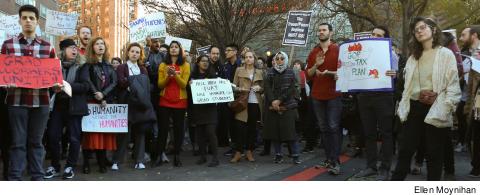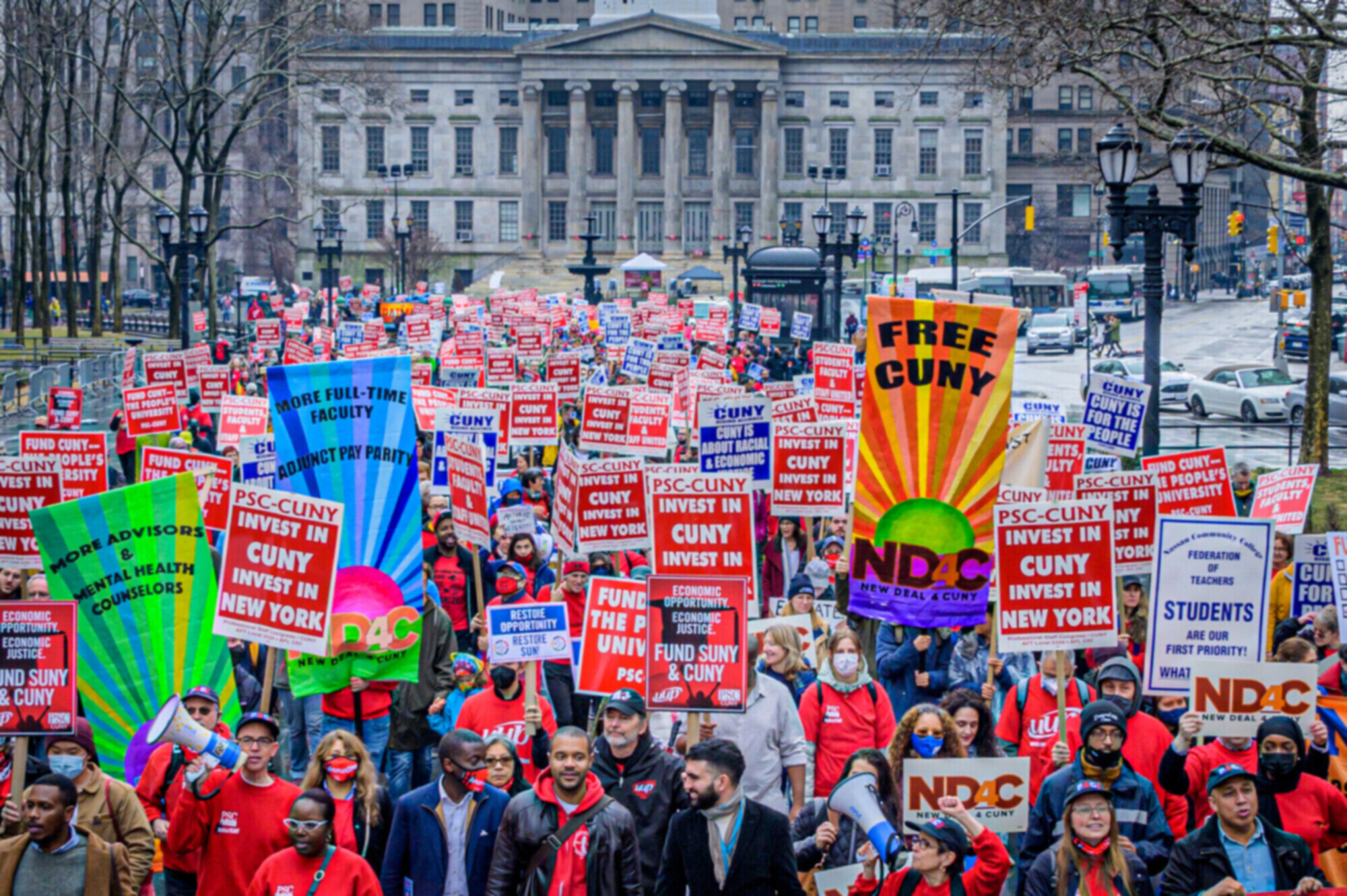 |
Public outcry against the Republican Party’s sweeping tax bill, which passed both houses of Congress, focused on what many called a wealth transfer of billions of dollars from middle-class households to the wealthiest 1 percent, as tax write-offs like the mortgage interest tax deduction would – if reconciled by both houses and signed into law – be scrapped in exchange for a dramatically lower corporate tax rate.
For PSC members, notable among the proposed changes are that interest on student loan debt payments would no longer be tax deductible, and graduate school tuition waivers would be considered taxable income, adding to the tax burden of students already struggling to make ends meet. Troubling higher-education advocates, the proposal would quadruple the tax burden for graduate students and discourage anyone without significant outside income from engaging in graduate study, threatening the viability of graduate research in the United States in the long run.
“PhD students at most American universities already have to juggle too many jobs and responsibilities to try and finish their degrees in a timely manner, and the GOP will add to that burden,” Graduate Center Assistant Director of Admissions Gerry Martini told Clarion. “Taxing tuition waivers will reinforce the notion that elite higher education is mostly for the wealthy, since, at the stroke of a pen, students will require many thousands more dollars to attend school.”
ATTACKING COLLEGE AFFORDABILITY
He continued, “Rather than impose new burdens on an over-stretched and cash-strapped group, we should be looking at ways to ease them – most especially by investing in public higher education, where so many of these students teach, both in graduate school and once they graduate. Years of debt should not be your reward for the pursuit of knowledge and teaching.”
For Martini, these two provisions constituted the first steps in the Trump administration’s larger attack on the affordability of higher education. “I think we should also fear what precedent this sets down the line for undergraduates,” he said. “After all, if a tuition waiver is ‘income’ then taxing undergraduate scholarships is the next logical step here.”
Rosa Squillacote, a PSC delegate from the Graduate Center, told Clarion, “The GOP’s attempt to make student loans and tuition waivers count as taxable income is an attack on graduate students as workers and their efforts to organize, as well as an attack on universities as sites of democracy. This attack makes sense: strong labor rights and a robust and accessible education are some of the greatest threats to the Trump regime. Making tuition waivers taxable income pushes graduate students further into economic precarity, making it even harder for these already overworked employees to feed themselves and develop their academic work while protecting their labor rights.”
Squillacote noted that this attack only furthered the need for free tuition at places like CUNY to serve working-class communities. “Where academic unions and the Left should take notice, however, is that this attack would be less effective if universities abolished or significantly reduced their tuition,” she said. “We should take this as a sign that tuition waiver programs – like [Governor Andrew] Cuomo’s weak Excelsior Scholarship – are totally insufficient in our current political climate. We need to push harder for radical transformation of educational institutions, with demands for free and fully funded universities and living wages for adjunct labor.”
As Jessica Mahlbacher, a Graduate Center PhD student in political science and an adjunct lecturer at Baruch and Hunter Colleges, put it, the proposal would affect GC students. “They’re getting penalized and it’ll make it harder for them to finish their degrees,” she said. “And taxing student loans would be really terrible because PhD students are more likely to be taking out larger loans.”
 |
As a result of the increased tax burden, she said that such students “may have to take on more graduate assistant hours, there’s always odd jobs you can do, but the more jobs you take on, the longer it takes you to finish your PhD or publish the articles you need to be competitive on the job market.”
INCREASING ADJUNCT PAY
Mahlbacher believed that the PSC was going in the right direction by demanding $7,000 per course per semester for adjuncts, some of whom are PhD students, to mitigate the damage. “Ultimately, what the union can do is fight for higher adjunct pay per class, make sure that students in their sixth and seventh year have access to insurance and tuition remission, those are good starting steps,” she said.
Another GC delegate, Tahir Butt, noted, “Our cash-starved institution can’t afford to pay us a fair wage, so we try to not starve by taking additional work, only to now be starved by a new tax plan.”
POTENTIAL SETBACKS
The proposals, if enacted, come at a perilous time for graduate worker labor activists, at both private and public universities. In the private sector, unions fear the Trump administration’s National Labor Relations Board could overturn an Obama-era decision to classify graduate instructors and assistants as workers entitled to collective bargaining rights. In the public sector, unions, including the PSC, expect a decision at the Supreme Court next year in Janus v. AFSCME that would bar the collection of agency-shop fees, thereby squeezing unions financially and undermining their organizing strength.
The Atlantic reported that the plan could constrain public universities in other ways: “By pressuring states to spend more on health care while hampering their ability to raise taxes (never an easy thing to begin with), GOP tax and budget policies could deprive public colleges of state funding, which would force American students to pay more. This would almost certainly lead to a rise in student debt. So it would make sense to make that debt easier to pay off. The House bill does the opposite. It would eliminate a provision that allows low- and middle-income student debtors to deduct up to $2,500 in student-loan interest each year.”
Various higher-education groups have blasted the tax proposals, calling them a threat to the future of university education. The American Council on Education President Ted Mitchell said in a letter to the House of Representatives’ Ways and Means Committee, “This legislation, taken in its entirety, would discourage participation in post-secondary education, make college more expensive for those who do enroll, and undermine the financial stability of public and private, two-year and four-year colleges and universities. According to the Committee on Ways and Means summary, the bill’s provisions would increase the cost to students attending college by more than $65 billion between 2018 and 2027. This is not in America’s national interest.”
He continued, “Roughly 145,000 graduate students received a tuition reduction in 2011-2012. Repeal of this provision would result in thousands of graduate students being subjected to a major tax increase. The provision is also critical to the research endeavors at major universities, particularly in the crucial science, technology, engineering and math (STEM) fields.”
‘GIVEAWAY TO THE WEALTHY’
As this newspaper went to press, progressive groups and unions were lobbying senators and targeting centrist Republicans in an effort to stall the reconciliation process to bring the two bills together. The House of Representatives’ bill and the Senate’s bill still have differences.
Overall, labor leaders have blasted the GOP tax proposals as giveaways to the wealthy. American Federation of Teachers President Randi Weingarten in a statement called the overall tax bill a “gut punch to the middle class that would crush the American dream of having a family and owning a home,” and said that it’s “not just that their tax bill is a massive giveaway to the wealthy and big corporations who don’t need it, but also that they’re doing it at the expense of the middle class, homeowners, and local community services like public schools, police departments and fire departments.”

